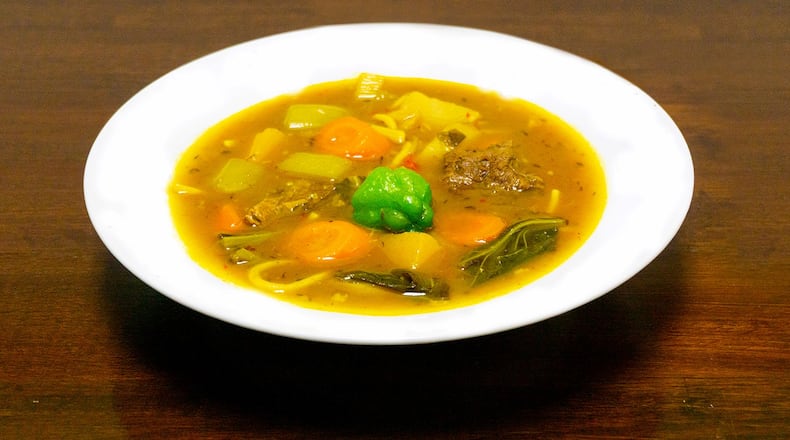Emmanuel Buteau always kicks off his new year with the same meal - a hot bowl of soup joumou.
Haitians around the world eat the squash-based soup every Jan. 1 in recognition of the country’s 1804 victory for independence against France, which made Haiti the first Black-led republic in the Western Hemisphere. Made from hearty ingredients including pasta, well-marinated meat, potatoes and vegetables, soup joumou has become a symbol of Haitian pride, culture and heritage.
“People making this food are passing on pride and a sense of honor to the next generation,” said Buteau, co-founder of the Haitian Institute of Atlanta.
When the clock hits midnight on Jan. 1, Atlanta’s immigrant communities will start a new year of celebrating traditions that honor their heritage. For Haitian-Americans, that means celebrating Haiti’s independence day and culture with food. For those who trace their roots to Colombia, a new year often means engaging in rituals to ensure health, safety and prosperity.
These traditions include eating 12 grapes for good luck at midnight, and running circles around a home, or block, to ensure safe travels.
“I think the funniest one for me is that you have to wear yellow underwear for good luck in the next year,” said Laura Estefenn, a marketing communications coordinator with the Latin American Association. “We also have another one where you take those little Ziploc bags, fill it with lentils and you put that in your wallet. That is meant for financial prosperity for the upcoming year.”
Estefenn’s favorite tradition is burning the año viejo, or old year. Families will write their resolutions on pieces of paper, and place them in a stuffed puppet, which is burned at midnight to signify new beginnings.
“For me that is when the clock resets for the new year,” said Estefenn, a Buckhead resident who will be ringing in 2022 in her hometown of Bogota, Colombia. “My grandma always prepares all the grapes for us, she prepares the lentils. It’s a special moment for all of us as a family to gather and do all the traditions together.”
Gatherings are also key part of Haitian independence day celebrations, as people will make it a point to share soup joumou with their family, friends and neighbors.
“During the period of colonization, enslaved Africans were forced by their oppressors to cultivate squash for the soup, but the slaves were not allowed to eat the soup,” Schneidine Louis, a vice consul at the Consulate General of Haiti in Atlanta, along with the chief of communication and public relations. “So when we won the battle against the French army and declared our independence, on January 1, 1804, our first president’s wife, Claire Heureuse, prepared the soup joumou and shared it with all.”
Louis said soup joumou signifies Haiti’s contribution to “changing the system established in this period, which was slavery, racist exploitation. It was a total win for humanity.” Earlier this month the U.N. cultural agency, UNESCO, recognized its importance, by adding soup joumou to its Intangible Cultural Heritage list, which aims to raise awareness of significant traditions and cultures from around the world.
“When we heard about that, we regarded it with pride,” said Louis, adding that she hopes the designation will spark feelings of unity and community among Haitians in the U.S. and overseas. “We have to build this country that our ancestors left for us.”
Buteau explains that almost every household has their own recipe for soup joumou. His late mother Marie Anide, would grow her own pumpkins in her Homestead, Florida, backyard, to make sure her soup tasted just right and would wake up before dawn to start cooking. Known for her love of spice, she always tossed in some extra Scotch bonnet peppers.
“It has to be the right kind of meat, the right kind of vegetables, and the pumpkin, it has to be the right kind with the right amount of sweetness,” Buteau, said. “You (make the soup) because that’s who you are.”
Paradise Afshar is a Report for America corps member covering metro Atlanta’s immigrant communities. The Atlanta Journal-Constitution and Report for America are partnering to raise funds to place multilingual journalists on the staff in The AJC newsroom to improve our coverage of these communities. We hope you’ll help us by donating to this initiative.
About the Author
The Latest
Featured



